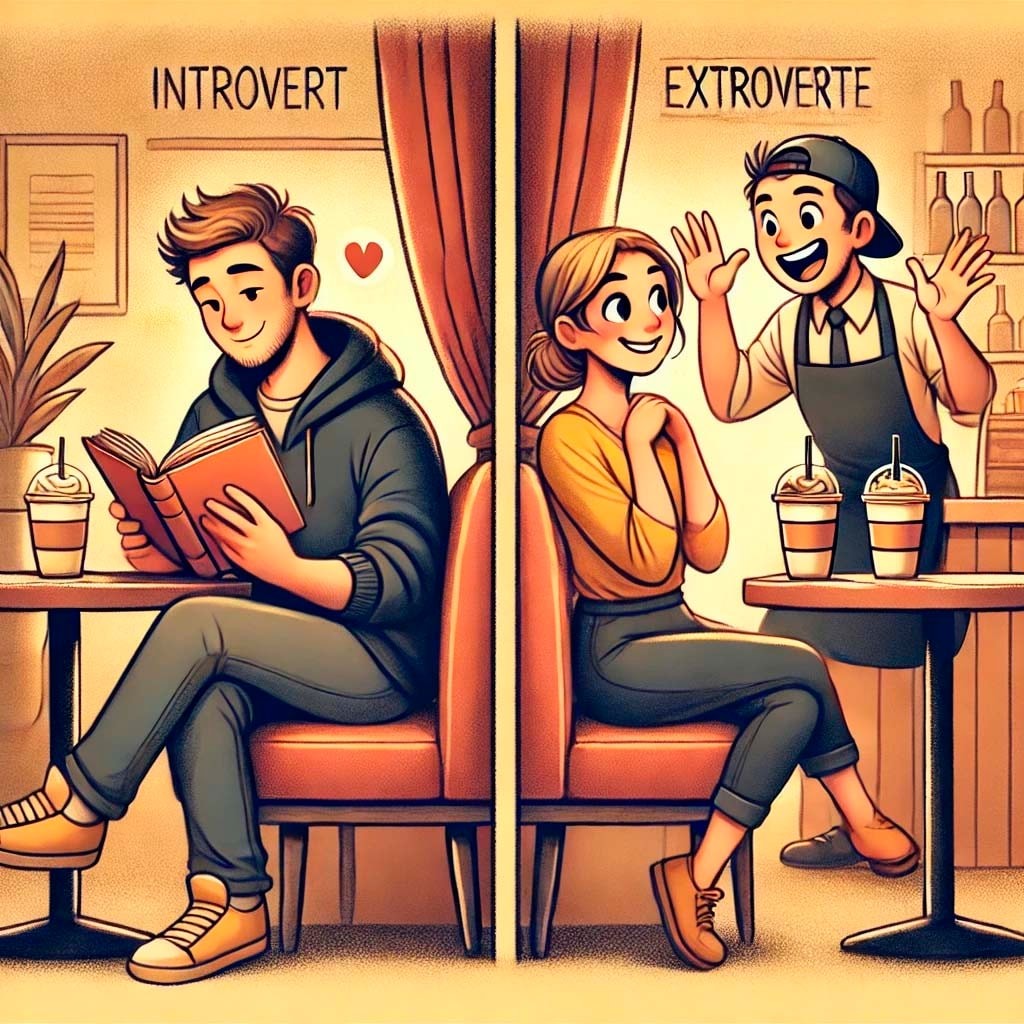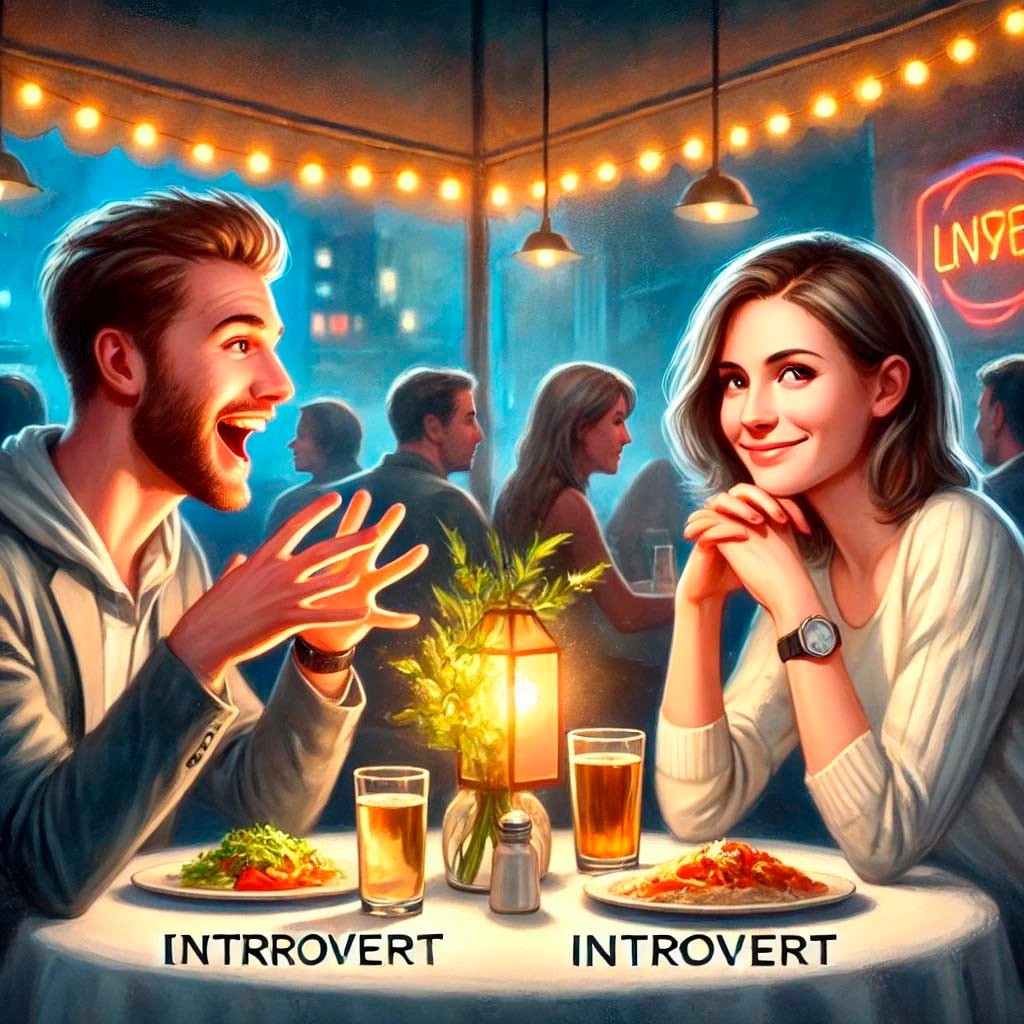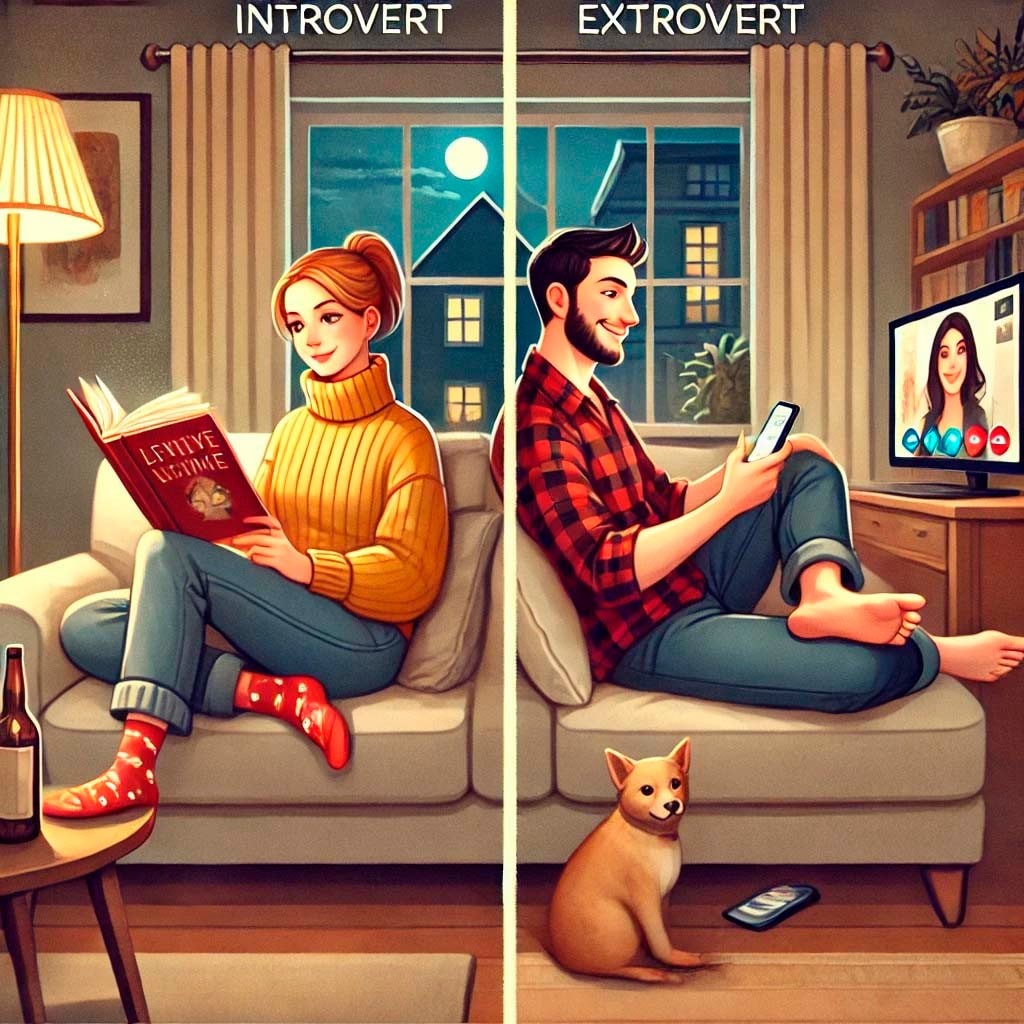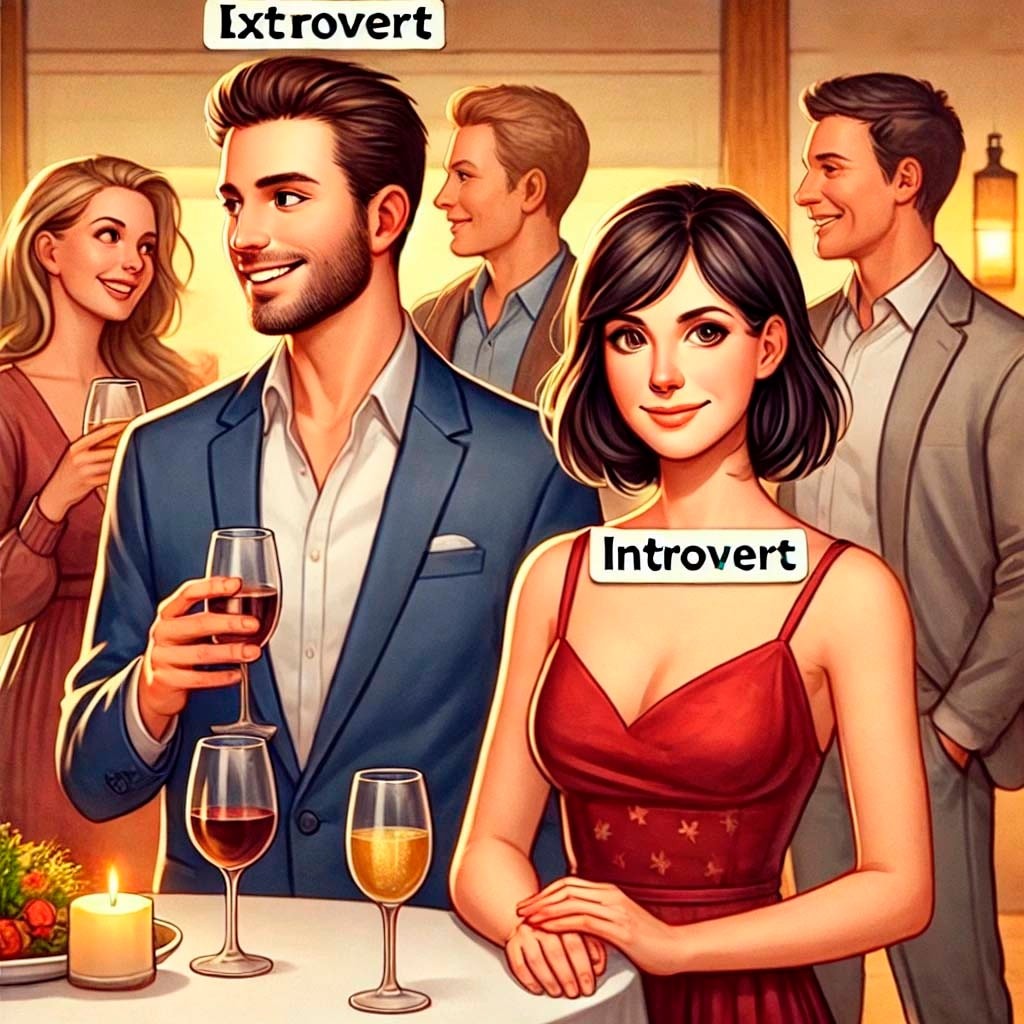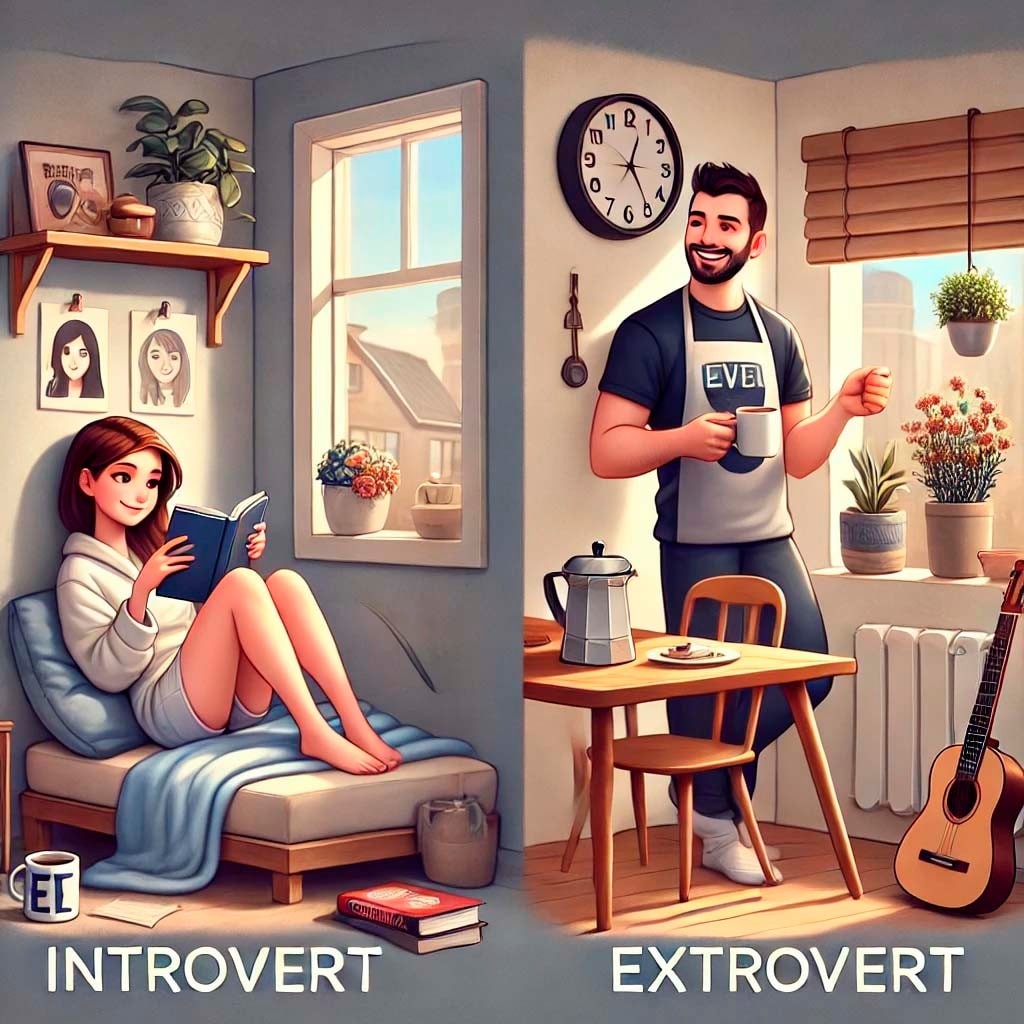If you’re with someone who has a very different social energy than you do, don’t fret-you’re not alone. There are introvert-extrovert couples, and they’re fairly common. But they come with their own special and unique challenges, too. One person enjoys social events, while the other enjoys time to herself. One person enjoys making spontaneous decisions, while the other enjoys getting herself ready in her head.
Despite such distinctions, introvert-extrovert relationships can be extremely fulfilling if both partners respect and understand each other’s needs. Instead of being regarded as something to overcome, such personality distinctions can be utilized as assets that provide balance to the relationship. The key to making it succeed is to learn to work around such distinctions in a way that maximizes the relationship rather than creating conflict.
Understanding Introverts and Extroverts
Before diving dive deep into solutions, it’s important to understand how introverts and extroverts function.
What is an Introvert?
- Introverts recharge by spending time alone.
- They prefer deep conversations over small talk.
- They often feel drained after long periods of social interaction.
- They process their thoughts internally before speaking.
Introversion is not the same as being shy or antisocial. Introverts simply need more solitude to regain energy.
What is an Extrovert?
- Extroverts feel energized by social interaction.
- They enjoy meeting new people and engaging in conversations.
- They tend to process their thoughts externally by talking things through.
- They thrive in dynamic, fast-paced environments.
Being an extrovert doesn’t mean someone is loud or attention-seeking. It just means they gain energy from being around others.
When these two personalities come together in a relationship, their differences can either create frustration or complement each other’s differences in a way that strengthens the bond.
Common Challenges in Introvert-Extrovert Relationships
Different Social Needs
Extroverts will want to have multiple events and social lives weekly, and introverts will need time to recharge. This social energy mismatch can create conflict if it is not respected and acknowledged.
Communication Differences
Extroverts tend to verbalize their thoughts as they occur to them, while introverts quietly think through their ideas in advance of speaking. This can create misunderstandings wherein the extrovert perceives that they’re doing all the talking, and the introvert is being bombarded with nonstop conversation.
Conflict Resolution Styles
When a conflict happens, most extroverts will want to discuss it and resolve it immediately, while introverts need to think through their feelings before they can talk through them. When such tendencies are not respected, a partner will feel pressure while the other will feel disregarded.
Energy Imbalance
An extrovert will come home after a party feeling energized and will want to socialize some more, while an introvert will feel overwhelmed and need to have some quiet time to recharge. The contrast can, at times, lead to frustration on both sides.
Practical Tips for Navigating a Dating Relationship
Introvert-extrovert dating can be a fulfilling and challenging relationship. It is not a case of changing each other, but rather understanding and accommodating each other and finding a balance. The techniques that follow present a step-by-step manner of assisting introverts and extroverts to make their relationship succeed while maintaining a healthy, successful, and satisfying partnership.
1. Balance Social Time and Alone Time
One of the biggest challenges in an introvert-extrovert relationship is differing social energy levels.
- For introverts: Being social takes energy, and too many social events in a row can feel overwhelming. It’s okay to say no to plans, but communicating this need without making your partner feel rejected is crucial.
- For extroverts: Social interaction is vital for you, and spending too much time alone can make you feel restless. However, respecting your partner’s need for downtime is important for maintaining harmony.
How to compromise:
- Alternate social nights with quiet nights at home. For example, if you have a party night on Friday night, spend a quiet night at home on Saturday night.
- Let the extrovert have some time with other people or with their peers while the introvert has some time alone without guilt.
- When you take your date to an event, schedule a realistic time frame in advance. This will prevent the extrovert from overstaying and the introvert from departing early.
2. Communicate in a Way That Works for Both of You
Introverts and extroverts have very different communication styles.
- Extroverts think out loud and may dominate conversations without realizing it. They are quick to express feelings and discuss issues.
- Introverts prefer to process thoughts internally before speaking. They need time to think before responding and may not immediately open up about feelings.
How to make communication smoother:
- For extroverts: Give your introverted partner time to formulate their thoughts before expecting a response. Avoid pressuring them to talk before they are ready.
- For introverts: Express when you need space to think but also make an effort to share your thoughts openly. Silence can sometimes make an extrovert feel ignored.
- If discussing an important topic, consider writing down your thoughts before the conversation. This can help introverts feel more prepared and allow extroverts to see their partner’s perspective more clearly.
- Avoid interrupting each other. Extroverts should slow down and give space for the introvert to speak, while introverts should make an effort to verbalize their thoughts.
3. Set Boundaries and Respect Each Other’s Needs
Boundaries are essential in any relationship, but especially in relationships that work in an introverted-extroverted dynamic.
- For introverts: You need quiet time to recharge. Setting clear boundaries about when and how you need alone time can prevent misunderstandings.
- For extroverts: You thrive on interaction and may feel neglected if your partner withdraws too often. Understanding that their need for solitude is not personal is important.
How to establish healthy boundaries:
- Define personal space: Have separate hobbies that each person does alone. For example, an introvert will need some time alone after work, while an extrovert will have a night out with people without their husband or wife.
- Define expectations regarding downtime: The introvert will inform their partner that they need some time alone to avoid making their partner feel rejected. Extroverts plan social time with their family or friends while their partners are recharging.
- Make time for “quiet time” in the relationship: Reading together in silence or walking separately can both be good ways to have some quiet time to help maintain balance.
4. Be Flexible with Plans and Social Engagements
Extroverts enjoy spontaneity, while introverts prefer structure and advance notice. Finding a balance between these two styles can reduce stress.
- For introverts: Be open to occasional spontaneous plans. Saying “yes” sometimes, even if it’s not your ideal scenario, can strengthen the relationship.
- For extroverts: Avoid springing last-minute plans on your partner, as introverts need time to prepare mentally. Instead of saying, “We’re going out in an hour,” try, “There’s an event on Saturday—would you like to come?”
How to find a middle ground:
- Give a heads-up: Extroverts should communicate plans ahead of time whenever possible.
- Have “opt-out” options: The introvert should feel comfortable saying no to a social event without pressure or guilt.
- Plan low-energy social events: Instead of a loud party, suggest activities like a movie night, a quiet dinner, or a small gathering with close friends.
5. Handle Conflict with Understanding
Conflict resolution is another area where introverts and extroverts differ.
- Extroverts prefer to talk things out immediately and openly. They may see silence as avoidance or emotional distance.
- Introverts need time to process emotions before responding. Confrontations can feel overwhelming, and they may withdraw instead of engaging in the moment.
How to navigate conflict effectively:
- For extroverts: Give your introverted partner space to think before pressing for a discussion. Understand that silence doesn’t mean indifference.
- For introverts: Try not to avoid difficult conversations for too long. Even if you need space, let your partner know you will revisit the topic later.
- If emotions are running high, agree on a time to talk when both partners feel ready. For example, “I need some time to think, but can we talk about this tomorrow?”
- Focus on solutions rather than blame. Use “I” statements instead of “you” statements to express feelings without making the other person defensive.
6. Learn to Enjoy Each Other’s Strengths
Instead of seeing differences as obstacles, recognize the ways they make the relationship stronger.
- For introverts: Let your extroverted partner bring excitement into your life. Their social nature can introduce you to new experiences and opportunities you may not have explored otherwise.
- For extroverts: Appreciate the calming influence your introverted partner provides. Their thoughtfulness and depth can add stability and reflection to your life.
Ways to celebrate each other’s strengths:
- Take turns doing activities so both personalities have equal enjoyment.
- Let introverts take charge of deep, serious conversations and social settings led by extroverts.
- Support one another’s hobbies and interests, although they do not necessarily complement each other. The extrovert can spend a quiet evening at home with their partner, and the introvert can have a party occasionally.
7. Make Date Nights Work for Both of You
Date nights should be enjoyable for both partners, so finding activities that accommodate both personality types is key.
Best date ideas for introvert-extrovert couples:
- Coffee shop mornings: A relaxed setting where you can enjoy conversation without too much social pressure.
- Nature hikes: Great for introverts who enjoy quiet and extroverts who like adventure.
- Cooking together at home: An interactive but low-key activity.
- Small group outings: A balance between social engagement and personal space.
- Road trips: Time together without the overstimulation of big crowds.
Avoid planning activities that force one partner too far out of their comfort zone. If the extrovert wants a big social night, they should also plan a quiet, intimate evening as a counterbalance.
8. Be Patient and Keep Learning
Dating someone with a different social style takes patience, but the effort is worth it.
- Introverts should try to be more open about their needs instead of expecting their partner to read between the lines.
- Extroverts should slow down and listen more, making space for their partner to express themselves in their own way.
Relationships are a learning experience, and introvert-extrovert couples can build something incredible when they embrace their differences instead of fighting against them.
By focusing on effective communication throughout, compromise, and respect, dating between an introvert and an extrovert can evolve into a relationship where both partners feel valued, heard, and happy.
Final Thoughts
Introvert-extrovert relationships require effort, but they can be extremely fulfilling. The three key factors to success are understanding, communication, and compromise. Instead of seeing diversity as a barrier, see it as a means to create balance and enrichment in your relationship.
Neither party should ever have to feel that they are constantly sacrificing their own desires to please their partner. When both parties respect and accommodate each other’s personalities, both can grow and blossom in their unique relationship together.
FAQs
Can introverts and extroverts have a successful relationship?
Yes! The greatest introvert-extrovert relationships are those that are built on understanding and compromise. If both of you honor your differences and work together with each other to find balance in your relationship, your relationship can be long-lasting, healthy, and rewarding.
How can an introvert recharge while dating an extrovert?
An introvert must let their partner know that they require some time alone without feeling guilty. Establishing boundaries, like planning some time for oneself after a social engagement, can preserve one’s energy level while still being present in a relationship.
What are good date ideas for introvert-extrovert couples?
Finding activities that satisfy both personalities is key. Some great options include:
- A quiet dinner followed by a social gathering
- A nature hike where both partners can enjoy moments of silence and conversation
- Cooking a meal together at home and then inviting friends over for dessert
The goal is to create balance so that both partners feel comfortable.
How can extroverts avoid overwhelming their introverted partner?
Extroverts will have to check with their partner beforehand to make social plans and be respectful of their desire to have some time to themselves. Instead of forcing an introvert to attend every social event, allow them other spaces to opt in at their convenience.














